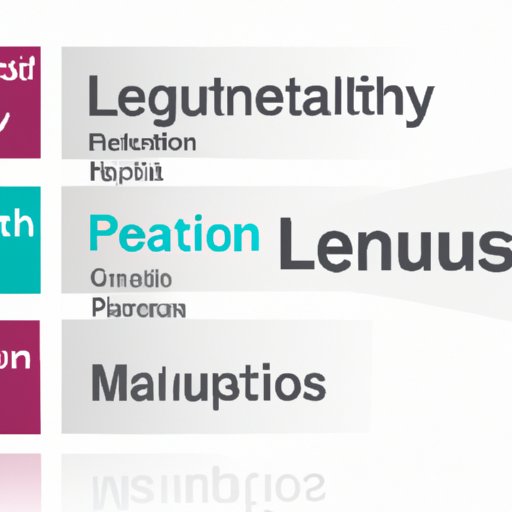Introduction
A leadership philosophy is a set of guiding principles that dictate how a leader behaves and interacts with their team. It is based on personal values and beliefs, and it serves as a basis for decision-making and problem-solving. A strong leadership philosophy can help to create an environment of trust, collaboration, and growth within an organization.
Definition of Leadership Philosophy
According to the Harvard Business Review, a leadership philosophy is “a personal statement of what you value most in leading, what you believe is essential to good leadership, and why it matters.” It is a way of defining your core values as a leader and communicating those values to your team. It provides clarity on expectations and helps to create an environment of trust and collaboration.
Overview of Different Leadership Philosophies
There are many different types of leadership philosophies, ranging from autocratic to democratic to servant leadership. Autocratic leaders rely heavily on their own ideas and decisions and typically do not take input from their team. Democratic leaders, on the other hand, encourage input from their team and strive to reach consensus. Servant leadership is a more holistic approach, where the leader focuses on the needs of their team and puts their interests first.

How to Develop Your Own Leadership Philosophy
Developing your own leadership philosophy requires reflection and self-awareness. It should be tailored to the specific needs of your team and organization. Here are a few steps to get started:
Decide What Values You Want to Uphold
Start by reflecting on the values that are important to you as a leader. Consider things like integrity, respect, honesty, and accountability. Once you have identified your core values, use them as a foundation for developing your leadership philosophy.
Set Goals and Objectives
Once you have identified your values, it is time to set goals and objectives. Think about the outcomes you want to achieve and how your leadership style can help you get there. For example, if one of your values is collaboration, your goal could be to increase team collaboration by 10%.
Communicate Your Ideas
It is important to communicate your ideas to your team so that everyone understands the expectations. Share your values, goals, and objectives with your team and explain how they will help to create a positive and productive work environment.

Benefits of Having a Leadership Philosophy
Having a clear and well-defined leadership philosophy can have many benefits for both the leader and their team. Here are a few of the most common benefits:
Enhances Motivation
A strong leadership philosophy can help to motivate employees by providing clarity on expectations and fostering a sense of purpose and direction. According to a study by the Harvard Business Review, “clearly articulated values and goals can provide a sense of purpose and meaning that drives motivation and performance.”
Encourages Collaboration
When a leader has a clear set of values and expectations, it encourages collaboration among team members. By creating an open and supportive environment, team members are more likely to share ideas and work together to achieve shared goals.
Clarifies Expectations
Having a leadership philosophy helps to clarify expectations for both the leader and the team. This can help to reduce confusion and ensure that everyone is on the same page when it comes to decision-making and problem-solving.
Common Challenges Faced When Developing a Leadership Philosophy
Although having a leadership philosophy can be beneficial, there are some challenges associated with developing and implementing one. Here are a few of the most common challenges:
Finding the Right Balance of Flexibility and Rigidity
It can be difficult to find the right balance between being flexible and rigid in your leadership style. Too much rigidity can stifle creativity and prevent the team from embracing new ideas, while too much flexibility can lead to confusion and lack of direction.
Adapting to Changing Environments
The business environment is constantly changing, and it is important for leaders to be able to adapt their leadership philosophy accordingly. Leaders need to be open to feedback and willing to make adjustments when necessary.
Ensuring Fairness and Consistency
Leaders must also strive to ensure fairness and consistency when applying their leadership philosophy. They need to make sure that their decisions are based on facts and data, rather than personal biases or opinions.

Impact of Leadership Philosophy on Teams and Organizations
Having a strong and well-defined leadership philosophy can have a positive impact on teams and organizations. Here are a few of the most common impacts:
Establishes Direction
A leadership philosophy helps to establish direction and provides clarity on expectations. It sets the tone for how the team should operate and provides guidance on decision-making and problem-solving.
Creates an Environment of Trust
A leadership philosophy helps to create an environment of trust by clearly communicating expectations and promoting open communication. Team members are more likely to trust their leader when they know what to expect and feel heard.
Facilitates Growth and Development
A leadership philosophy also helps to facilitate growth and development within the team. By setting clear goals and objectives, it encourages team members to strive for excellence and develop their skills.
Conclusion
In conclusion, having a clear and well-defined leadership philosophy is an important part of being a successful leader. It helps to create an environment of trust and collaboration, while also facilitating growth and development. It is important to take the time to reflect on your values and beliefs and develop a leadership philosophy that is tailored to the specific needs of your team and organization.
Summary of Key Points
A leadership philosophy is a set of values, goals, and objectives that guide the actions of a leader. There are many different types of leadership philosophies, ranging from autocratic to democratic to servant leadership. Developing your own leadership philosophy requires reflection and self-awareness. Having a strong leadership philosophy can help to create an environment of trust, collaboration, and growth, while also enhancing motivation and clarifying expectations.
Final Thoughts
A leadership philosophy is an important tool for any leader. It helps to define the leader’s values and beliefs, while also providing clarity on expectations. Taking the time to develop a leadership philosophy can have many benefits for both the leader and their team.
(Note: Is this article not meeting your expectations? Do you have knowledge or insights to share? Unlock new opportunities and expand your reach by joining our authors team. Click Registration to join us and share your expertise with our readers.)
